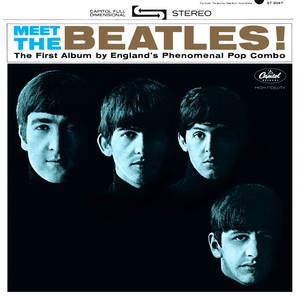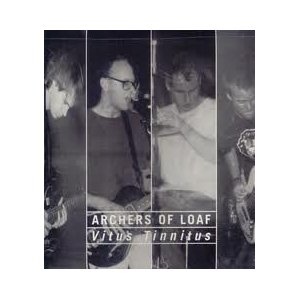
Mathis James Reed was an American blues musician and songwriter. His particular style of electric blues was popular with blues as well as non-blues audiences. Reed's songs such as "Honest I Do" (1957), "Baby What You Want Me to Do" (1960), "Big Boss Man" (1961), and "Bright Lights, Big City" (1961) appeared on both Billboard magazine's rhythm and blues and Hot 100 singles charts.

Archers of Loaf is an American indie rock band originally formed in Chapel Hill, North Carolina, in 1991. The group toured extensively and released four studio albums, one compilation, numerous singles and EPs, and a live album which was released after the band broke up in 1998. In 2011 the band began a reunion tour that coincided with the reissue of four of its albums by Merge Records. In July 2022, the band announced the release of their first album in nearly twenty-five years, Reason in Decline, released also via Merge Records in October of the same year.

Icky Mettle is the first studio album recorded by the indie rock band Archers of Loaf. It was produced and engineered by Caleb Southern at Kraptone Studios in Chapel Hill, North Carolina, and released by Alias Records on September 7, 1993. A deluxe reissue of the album was released by Merge Records in 2011.

Beggars Banquet is the 7th British and 9th American studio album by the English rock band the Rolling Stones, released on 6 December 1968 by Decca Records in the United Kingdom and London Records in the United States. It was the first Rolling Stones album produced by Jimmy Miller, whose production work formed a key aspect of the group's sound throughout the late 1960s and early 1970s.

Meet the Beatles! is a studio album by the English rock band the Beatles, released as their second album in the United States. It was the group's first American album to be issued by Capitol Records, on 20 January 1964 in both mono and stereo formats. It topped the popular album chart on 15 February 1964 and remained at number one for eleven weeks before being replaced by The Beatles' Second Album. The cover featured Robert Freeman's iconic portrait of the Beatles used in the United Kingdom for With the Beatles, with a blue tint added to the original stark black-and-white photograph.

Pink Flag is the debut studio album by English rock band Wire. It was released in November 1977 by Harvest Records. The album gained Wire a cult following within independent and post-punk music upon its initial release, later growing to be highly influential on many other musicians.

White Trash Heroes is the fourth studio album from the indie rock band Archers of Loaf, released in 1998 by Alias Records. In 2012 the album was reissued by Merge Records on two CDs with new, re-imagined art by Casey Burns.
Crooked Fingers was an American indie rock band, led by the former Archers of Loaf frontman Eric Bachmann. A vehicle for Bachmann's songwriting, the band's lineup changed between each record. Crooked Fingers released albums on WARM Records and Merge Records, and also independently. Bachmann retired the name Crooked Fingers in January 2016 with a pair of shows in New York City and Durham, NC, playing the first two records in their entirety with a string ensemble and has since been releasing albums under his name.

Eric Bachmann is an American multi-instrumentalist, songwriter, and producer. He rose to prominence as the frontman of Archers of Loaf and Crooked Fingers. Originally a saxophone major at Appalachian State University, Bachmann’s music is distinctive for its creative and innovative arrangements. In addition to the guitar, he plays the piano and banjo regularly on tour. He was born in Greensboro, North Carolina, and grew up throughout the Southern United States. He currently lives in Athens, Georgia.

Free-for-All is the second studio album by American hard rock musician Ted Nugent. It was released in October 1976 by Epic Records, and was his first album to go platinum.
Alias Records is a small American indie-rock record label based in Lexington, Kentucky.
To the Races is an album by Eric Bachmann, of the bands Crooked Fingers and Archers of Loaf. It was released on August 22, 2006.

Live, Love, Larf & Loaf is a studio album by the English/American experimental rock quartet French Frith Kaiser Thompson. It was the group's first album and was recorded at Mobius Music in San Francisco in March 1987. The album was released in 1987 in the United States by Rhino Records on LP, CD and cassette. The CD release contained two extra tracks. The album was reissued in 2008 by Fledg'ling Records with five extra tracks recorded live at the Ashkenaz in Berkeley, California.

All the Nations Airports is the third studio album recorded by the indie rock band Archers of Loaf. Although the band was still signed to Alias Records the album was released by Elektra Records in 1996, making it the first to be distributed by a major label.

Archers of Loaf vs. The Greatest of All Time is the first EP by North Carolina indie rock band Archers of Loaf. The EP was recorded shortly after their first album Icky Mettle, and the styles are very similar.

The Speed of Cattle is a compilation album recorded by the indie rock band Archers of Loaf. It was recorded in Seattle over a three-week period, the longest the band had taken to record an album at the time.

Vitus Tinnitus is a live EP by Archers of Loaf, their first officially released live recording. It was released in 1997. The first six tracks were recorded live at The Middle East in Cambridge, MA, on October 26, 1996. The last two tracks are remixes from All the Nations Airports.

Uncanney Valley is the fifth and final studio album by American indie rock band The Dismemberment Plan. The album was released on Partisan Records on October 14, 2013 and is the band's first album since their initial break-up following the release of 2001's Change.
Breaks in the Armor is an album by the American alternative rock band Crooked Fingers, released in 2011. It was released the same year as the reunion of Archers of Loaf, Eric Bachmann's previous band.
Web in Front is a song by American indie rock band Archers of Loaf, originally released as a 7" single on Alias Records in 1993. It was their first release on the Alias label, and their first single from their debut album Icky Mettle. The original single also included the tracks "Bathroom" and "Tatayana".















